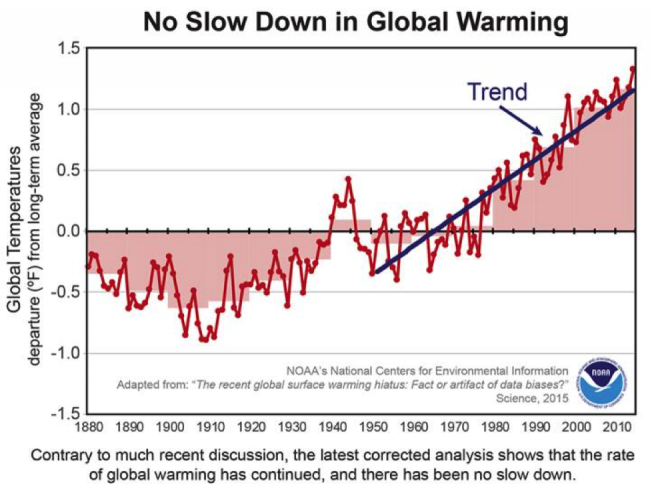The recent global surface warming hiatus: Fact or artifact of data biases?
Much study (IPCC Fifth Assessment Report) has been devoted to the possible causes of a decrease in the upward trend of global surface temperatures since 1998, a phenomenon that has been dubbed the global warming “hiatus.” However, a new study by Karl et al. has called into question the underlying data used to detect the “hiatus”. They analyzed improved ocean sea surface temperatures, a more comprehensive set of land surface air temperature product, and two additional years of data that were not available to the IPCC Fifth Assessment Report. The analyses of this new study do not show a slowdown in the rate of global surface air temperature increase. The new analysis reveals that global trends in recent decades are higher than reported in the IPCC Fifth Assessment Report, and the central estimate for the rate of warming during the first 15 years of the 21st century is at least as great as the last half of the 20th century. These results do not support the notion of a “slowdown” in the increase of global surface temperature. Additionally, previous scientific work has identified a number of transitory factors (such as changes in the radiative balance of the planet (e.g., volcanoes, solar energy), changes in ocean circulation and related deep ocean heat uptake, and atmospheric circulation changes) that have acted to reduce the rate of global temperature increase in recent decades. Had these transitory factors not been operating the rate of temperature increase in the 21st Century could have been even higher than that observed in the latter half of the 20th Century. Once these transitory factors subside, the rate of global temperature increase could be poised to exceed the multi-decadal temperature increases of the late 20th Century.

1NOAA, National Centers for Environmental Information
2LMI, McLean, VA
Topics
- Warming Hiatus
